Corporate Governance for Banks in Southeast Europe: Policy - IFC
Corporate Governance for Banks in Southeast Europe: Policy - IFC
Corporate Governance for Banks in Southeast Europe: Policy - IFC
Create successful ePaper yourself
Turn your PDF publications into a flip-book with our unique Google optimized e-Paper software.
The duty of care requires that board members exercise reasonable care, prudence, and diligence <strong>in</strong> theiroversight of the bank. The practical implications of this duty are that board members are expected to satisfythemselves that decision-mak<strong>in</strong>g structures and report<strong>in</strong>g and compliance systems are function<strong>in</strong>g properly,and that an external <strong>in</strong>dependent auditor is appo<strong>in</strong>ted and acts <strong>in</strong> an objective and <strong>in</strong>dependent way.On the other hand, the duty of loyalty requires an undivided and unselfish loyalty to the bank and demandsthat there be no conflict between the board member’s self-<strong>in</strong>terest and his or her duty to the bank. Thepractical implication of the duty of loyalty is that board members are required to act <strong>in</strong> the <strong>in</strong>terest of thebank and refuse any action, or to take part <strong>in</strong> any deliberation, <strong>in</strong> which they have a conflict of <strong>in</strong>terest withthe bank. An implicit obligation of both duties is that board members are to maximize the long-term value ofthe bank <strong>for</strong> shareholders. 18Generally speak<strong>in</strong>g, the fiduciary duties that require board members to act <strong>in</strong> the best <strong>in</strong>terests of the bankimply that that they also take <strong>in</strong>to account the <strong>in</strong>terests of stakeholders, depositors <strong>in</strong> particular, and actresponsibly toward them. To do otherwise implies putt<strong>in</strong>g the bank at risk.Recommendations:Roles and responsibilities of the board: SEE boards should have a clear understand<strong>in</strong>g of their role andexercise sound and objective judgment. The legal framework should make it clear that the board has overallresponsibility <strong>for</strong> the bank, <strong>in</strong>clud<strong>in</strong>g approv<strong>in</strong>g and oversee<strong>in</strong>g the bank’s strategy, budget, risk appetite,and corporate governance. The role, responsibilities, and specific tasks of boards are well-documented <strong>in</strong><strong>in</strong>ternational best practice. Boards and supervisors need to be well-versed <strong>in</strong> <strong>in</strong>ternational best practice.Oversight of management: To per<strong>for</strong>m its role, the board should have the authority to select and, whennecessary, replace senior management. A clear l<strong>in</strong>e of accountability should exist between board andmanagement.Duties of board members: The duties of loyalty and care, as well as the specific roles and responsibilitiesof board members, should be clarified <strong>in</strong> (<strong>in</strong>ternal and external) rules and regulations and should be clearlycommunicated to board members and executives. The duties and obligations of supervisory board membersshould be covered by <strong>in</strong>duction tra<strong>in</strong><strong>in</strong>g, supported by development programs offered, <strong>for</strong> example, by <strong>in</strong>stitutesof directors, and should be made explicit <strong>in</strong> the employment contracts with the bank and set out <strong>in</strong> clear termsof reference.Personal responsibility of board members: Board members are responsible <strong>for</strong> oversee<strong>in</strong>g the bank,<strong>in</strong>clud<strong>in</strong>g its compliance with the law. Board members must be aware that they may be personally liable ifthere is fraud or if they act negligently or <strong>in</strong> breach of trust. Insurance may protect board members aga<strong>in</strong>st thef<strong>in</strong>ancial consequences of such a f<strong>in</strong>d<strong>in</strong>g.Guidance on board practices: Sufficient guidance on board practices should be available. M<strong>in</strong>imum standardsare typically set <strong>in</strong> law, while best practices are generally set <strong>in</strong> voluntary codes. Boards should <strong>in</strong><strong>for</strong>m themselvesand be aware of what is expected of them and what standards they are expected to comply with.Recommendations specific to boards of subsidiaries operat<strong>in</strong>g with<strong>in</strong> group structures are found below <strong>in</strong>Section III.A.7.18 A number of papers discuss the fiduciary duties of directors towards depositors and equity-debtholders. In particular see:Jonathan R. Macey and Maureen O’Hara, “The <strong>Corporate</strong> <strong>Governance</strong> of <strong>Banks</strong>,” Federal Reserve Bank of New York, Economic <strong>Policy</strong> Review (April2003). http://www.newyorkfed.org/research/epr/03v09n1/0304mace.pdf.Bo Becker and Per Stromberg, “Fiduciary Duties and Equity-Debtholder Conflicts”, Harvard Bus<strong>in</strong>ess School (Work<strong>in</strong>g Paper 10-070 - November30,2011). www.hbs.edu/research/pdf/10-070.pdfOffice of the Comptroller of the Currency, “The Director’s Book”, US Department of The Treasury (October 2010). http://www.occ.gov/publications/publications-by-type/other-publications-reports/director.pdf<strong>Corporate</strong> <strong>Governance</strong> <strong>for</strong> <strong>Banks</strong> <strong>in</strong> <strong>Southeast</strong> <strong>Europe</strong> <strong>Policy</strong> Brief 13



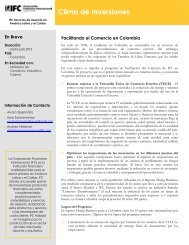
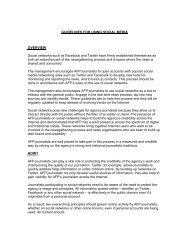
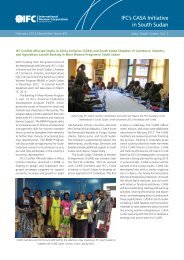
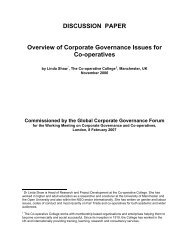
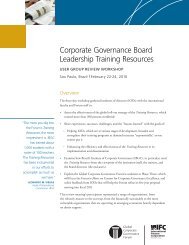

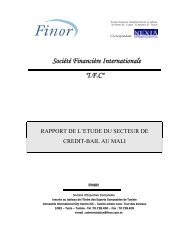


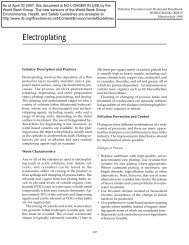
![Print a two-page fact sheet on this project [PDF] - IFC](https://img.yumpu.com/43449799/1/190x245/print-a-two-page-fact-sheet-on-this-project-pdf-ifc.jpg?quality=85)


